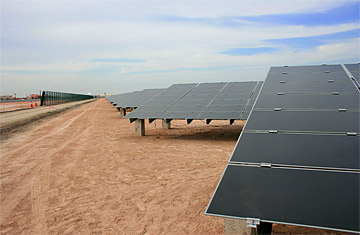
Solar panels at an Enviromena project site in Abu Dhabi
Sami Khoreibi couldn't stop beaming at his company's work. The baby-faced CEO of Enviromena Power Systems, Khoreibi started his business just a little over a year ago. Now he was standing over a 10-megawatt solar farm in the desert outside Abu Dhabi, with row after row of solar panels angled to the Middle East sun like bathers lying poolside. The solar farm was the first tangible evidence of Abu Dhabi's Masdar City, a $22 billion project that is planned to be the first zero-carbon footprint, totally renewably powered settlement — a monument to the use of technology to conquer hydrocarbons. "This is bringing attention and capital from around the world to Abu Dhabi," says Khoreibi. "We're going to use this as a launching pad for clean development."
If Abu Dhabi isn't the last place you'd expect to find ambitious plans for solar energy and ultra-green construction, it has to be close. The seaside capital of the United Arab Emirates (U.A.E.) is the world's fifth largest producer of petroleum, and the wealth that oil brings this former fishing village is evident in the foreign luxury cars that choke its highways, running on gas that costs just 45 cents a gallon. But a year ago, the government launched the multibillion-dollar Masdar Initiative, a combination clean-tech investment fund, property developer and renewable-energy start-up, all dedicated to preparing Abu Dhabi for the end of oil and positioning it as an unlikely green leader. (Read TIME's "Heroes of the Environment 2008.")
This week the city is hosting the second annual World Future Energy Summit (WFES), a gathering of clean-tech companies and luminaries that has quickly emerged as, as the New York Times put it recently, a kind of Davos for the postcarbon set. And while much of the rest of the world is using the financial crisis as an excuse to put off the transition to cleaner power, in the WFES's opening session today, Abu Dhabi announced that it had pledged that 7% of its energy would come from renewable sources by 2020, up from nothing today. "This is really a very powerful image," says Rajendra Pachauri, the chair of the U.N.'s Intergovernmental Panel on Climate Change, one of the summit's A-list attendees. "It clearly shows that a country that has no immediate economic need to diversify its energy production is willing and able to do so."
More than that, Masdar City and the WFES as a whole show the triumph of a kind of techno-environmentalism that would be all but unrecognizable to the crunchy nature lovers who once dominated the green movement. A walk through the summit's cavernous exhibition area, where models push mini–wind turbines, reveals booths dedicated to thin-film solar arrays, geothermal pumps and carbon-trading consultancies. There's little about trees or wildlife, nothing about environmental sacrifice — this is about the business of getting the carbon out of our energy supply as quickly as possible. And even in the middle of a worldwide financial crisis, it's a potentially lucrative business, one with the opportunity for global growth that few other industries have. "This is one of the few markets left that is surviving the crisis," says Khaled Awad, the director of Masdar's property-development unit. (See pictures of the effects of global warming.)
None of the tech is cleaner or higher than Masdar City itself, designed by the greenish British architect Norman Foster. Beyond being completely powered by renewables — mostly rooftop solar panels — Masdar will be a car-free city. Instead, the designers will build a personal-rapid-transit (PRT) system, an automated cable-car-like network that will whiz residents around the city's streets. Planners unveiled a model of a PRT car on the summit's first day. With the sleek silhouette of a racing motorcycle, but with room for four passengers, the PRT seems to have escaped from the movie Tron. It's enough to turn green-tech nerds giddy, even though it looks like the kind of sci-fi project that may have gotten too complicated for its own good.
But Masdar and the WFES aren't about simplicity — they're about silicon and solar and the power of technology to free us from carbon without calling for uncomfortable sacrifices. "You can have your lifestyle and your business here," says Masdar's Awad. And though it may make old-school greens shake in their Birkenstocks, this carbon-free city next to a very unsustainable desert metropolis — where watering keeps the lawns green in the dry winter and everything is air-conditioned — represents at least one future of environmentalism, a future that embraces new technology to remedy the ills of old technology. That's because those in the rising developing world — which is how Abu Dhabi is classified, despite a GDP per capita of $63,000 — want to enjoy the energy-intensive lifestyles of the developed world, and they don't want fears over climate change to stop them. The best hope is that the innovation personified by Masdar and the WFES can beat the pace of warming. Masdar may seem like a mirage, but "this is absolutely real," says Nicholas Stern, a British economist and climate-change expert. "I'm very optimistic that this is happening."
